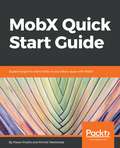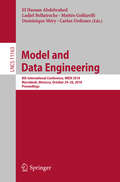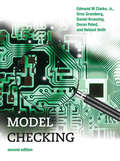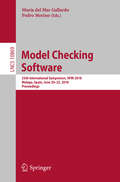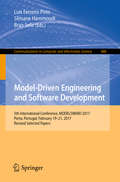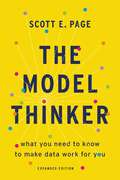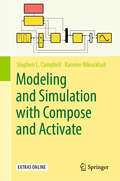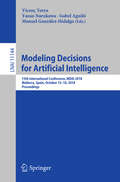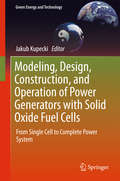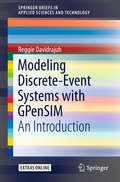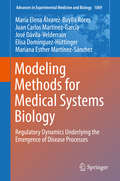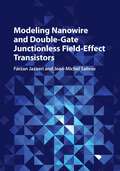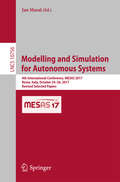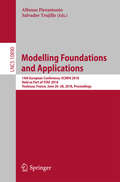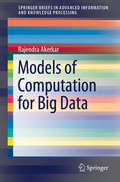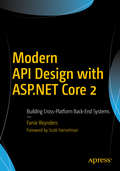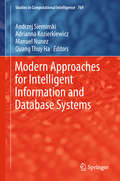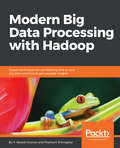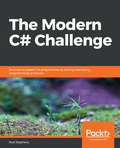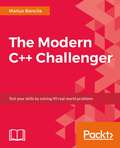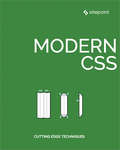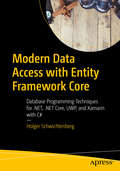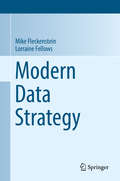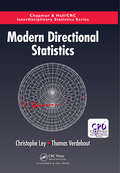- Table View
- List View
MobX Quick Start Guide: Supercharge the client state in your React apps with MobX
by Pavan Podila Michel WeststrateApply functional Reactive programming for simple and scalable state management with MobXKey FeaturesThe easiest way to learn MobX to enhance your client-side state-managementUnderstand how the concepts and components fit togetherWork through different state management scenarios with MobXBook DescriptionMobX is a simple and highly scalable state management library in JavaScript. Its abstractions can help you manage state in small to extremely large applications. However, if you are just starting out, it is essential to have a guide that can help you take the first steps. This book aims to be that guide that will equip you with the skills needed to use MobX and effectively handle the state management aspects of your application.You will first learn about observables, actions, and reactions: the core concepts of MobX. To see how MobX really shines and simplifies state management, you'll work through some real-world use cases. Building on these core concepts and use cases, you will learn about advanced MobX, its APIs, and libraries that extend MobX.By the end of this book, you will not only have a solid conceptual understanding of MobX, but also practical experience. You will gain the confidence to tackle many of the common state management problems in your own projects.What you will learnExplore the fundamental concepts of MobX, such as observables, actions, and reactionsUse observables to track state and react to its changes with validations and visual feedback (via React Components)Create a MobX observable from different data typesDefine form data as an observable state and tackle sync and async form validationsUse the special APIs to directly manipulate observables, tracking its changes, and discovering the reasons behind a changeTackle any state management issue you may have in your app by combining mobx-utils and mobx-state-treeExplore the internals of the MobX reactive system by diving into its inner workingsWho this book is forThis book is for web developers who want to implement easy and scalable state management for their apps. Knowledge of HTML, CSS, and JavaScript is assumed
#Moby-Dick; Or, The Whale: A Literary Classic Told in Tweets for the 21st Century Audience (Twit Lit Classics)
by Mike BezemekMoby Dick is regularly hailed as one of the greatest works of American literature. But suppose Ishmael had instead shared his tale in tweets? #Moby-Dick or The Whale in Tweets hilariously reimagines Herman Melville's classic whaling novel in just 200 tweets, each 140 characters or less. Ishmael here! Went broke in NYC, Super bored with land (damp drizzly soul,) I'm going to sea! #callme #whalingvoyage In this witty abridgment, mad captain Ahab's quest for vengeance upon a white whale is retold with Internet acronyms. The plight of the Pequod and its motley crew is punctuated by the occasional emoji. And Ishmael ponders whaling and humanity with hashtags. Including an appendix that presents the original passages upon which each tweet is derived, #Moby Dick offers modern readers an entertaining and accessible companion to a great American classic.
Model and Data Engineering: 8th International Conference, MEDI 2018, Marrakesh, Morocco, October 24–26, 2018, Proceedings (Lecture Notes in Computer Science #11163)
by El Hassan Abdelwahed Ladjel Bellatreche Mattéo Golfarelli Dominique Méry Carlos OrdonezThis book constitutes the refereed proceedings of the 8h International Conference on Model and Data Engineering, MEDI 2018, held in Marrakesh, Morocco, in October 2018.The 23 full papers and 4 short papers presented together with 2 invited talks were carefully reviewed and selected from 86 submissions. The papers covered the recent and relevant topics in the areas of databases; ontology and model-driven engineering; data fusion, classsification and learning; communication and information technologies; safety and security; algorithms and text processing; and specification, verification and validation.
Model Checking, second edition (Cyber Physical Systems Series)
by Edmund M. Clarke Orna Grumberg Daniel Kroening Doron Peled Helmut VeithAn expanded and updated edition of a comprehensive presentation of the theory and practice of model checking, a technology that automates the analysis of complex systems.Model checking is a verification technology that provides an algorithmic means of determining whether an abstract model—representing, for example, a hardware or software design—satisfies a formal specification expressed as a temporal logic formula. If the specification is not satisfied, the method identifies a counterexample execution that shows the source of the problem. Today, many major hardware and software companies use model checking in practice, for verification of VLSI circuits, communication protocols, software device drivers, real-time embedded systems, and security algorithms. This book offers a comprehensive presentation of the theory and practice of model checking, covering the foundations of the key algorithms in depth. The field of model checking has grown dramatically since the publication of the first edition in 1999, and this second edition reflects the advances in the field. Reorganized, expanded, and updated, the new edition retains the focus on the foundations of temporal logic model while offering new chapters that cover topics that did not exist in 1999: propositional satisfiability, SAT-based model checking, counterexample-guided abstraction refinement, and software model checking. The book serves as an introduction to the field suitable for classroom use and as an essential guide for researchers.
Model Checking Software: 25th International Symposium, SPIN 2018, Malaga, Spain, June 20-22, 2018, Proceedings (Lecture Notes in Computer Science #10869)
by María Del Gallardo Pedro MerinoThis book constitutes the refereed proceedings of the 25th International Symposium on Model Checking Software, SPIN 2018, held in Malaga, Spain, in June 2018.The 14 papers presented, 1 short paper, and 1 demo-tool paper, were carefully reviewed and selected from 28 submissions. Topics covered include formal verification techniques for automated analysis of software; formal analysis for modeling languages, such as UML/state charts; formal specification languages, temporal logic, design-by-contract; model checking, automated theorem proving, including SAT and SMT; verifying compilers; abstraction and symbolic execution techniques; and much more.
Model-Driven Engineering and Software Development: 5th International Conference, MODELSWARD 2017, Porto, Portugal, February 19-21, 2017, Revised Selected Papers (Communications in Computer and Information Science #880)
by Luís Ferreira Pires Slimane Hammoudi Bran SelicThis book constitutes thoroughly revised and selected papers from the 5th International Conference on Model-Driven Engineering and Software Development, MODELSWARD 2017, held in Porto, Portugal, in February 2017. The 20 thoroughly revised and extended papers presented in this volume were carefully reviewed and selected from 91 submissions. They contribute to the development of highly relevant research trends in model-driven engineering and software development such as methodologies for MDD development and exploitation, model-based testing, model simulation, domain-specific modeling, code generation from models, new MDD tools, multi-model management, model evolution, and industrial applications of model-based methods and technologies.
The Model Thinker: What You Need to Know to Make Data Work for You
by Scott E. PageHow anyone can become a data ninja From the stock market to genomics laboratories, census figures to marketing email blasts, we are awash with data. But as anyone who has ever opened up a spreadsheet packed with seemingly infinite lines of data knows, numbers aren't enough: we need to know how to make those numbers talk. In The Model Thinker, social scientist Scott E. Page shows us the mathematical, statistical, and computational models--from linear regression to random walks and far beyond--that can turn anyone into a genius. At the core of the book is Page's "many-model paradigm," which shows the reader how to apply multiple models to organize the data, leading to wiser choices, more accurate predictions, and more robust designs. The Model Thinker provides a toolkit for business people, students, scientists, pollsters, and bloggers to make them better, clearer thinkers, able to leverage data and information to their advantage.
Modeling and Simulation with Compose and Activate
by Ramine Nikoukhah Stephen L. CampbellThis book provides a tutorial in the use of Compose and Activate, software packages that provide system modeling and simulation facilities. Advanced system modeling software provide multiple ways of creating models: models can be programmed in specialized languages, graphically constructed as block-diagrams and state machines, or expressed mathematically in equation-based languages. Compose and Activate are introduced in this text in two parts. The first part introduces the multi-language environment of Compose and its use for modeling, simulation and optimization. The second describes the graphical system modeling and optimization with Activate, an open-system environment providing signal-based modeling as well as physical system component-based modeling. Throughout both parts are applied examples from mechanical, biological, and electrical systems, as well as control and signal processing systems. This book will be an invaluable addition with many examples both for those just interested in OML and those doing industrial scale modeling, simulation, and design. All examples are worked using the free basic editions of Activate and Compose that are available.
Modeling Decisions for Artificial Intelligence: 15th International Conference, MDAI 2018, Mallorca, Spain, October 15–18, 2018, Proceedings (Lecture Notes in Computer Science #11144)
by Vicenç Torra Yasuo Narukawa Isabel Aguiló Manuel González-HidalgoThis book constitutes the proceedings of the 15th International Conference on Modeling Decisions for Artificial Intelligence, MDAI 2018, held in Mallorca, Spain, in October 2018.The 24 papers presented in this volume were carefully reviewed and selected from 43 submissions. The book also contains one invited talk in full paper length. The papers were organized in topical sections named: aggregation operators, fuzzy measures and integrals; decision making; clustering and classification; and data privacy and security.
Modeling, Design, Construction, and Operation of Power Generators with Solid Oxide Fuel Cells: From Single Cell To Complete Power System (Green Energy And Technology)
by Jakub KupeckiThe book summarizes the current state of the solid oxide fuel cell (SOFC) technology in power generation applications. It describes the single cells, SOFC stacks, micro-combined heat and power systems, large-scale stationary power generators and polygeneration units. The principles of modeling, simulation and controls of power systems with solid oxide fuel cells are presented and discussed. Authors provide theoretical background of the technology followed by the essential insights into the integrated power systems. Selected aspects of the design, construction and operation of power units in range from single kilowatts to hundreds of kilowatts are presented. Finally, the book reports the selected studies on prototype systems which have been constructed in Europe.The book discusses the theoretical and practical aspects of operation of power generators with solid oxide fuel cells including fabrication of cells, design of stacks, system modeling, simulation of stationary and non-stationary operation of systems, fuel preparation and controls.
Modeling Discrete-Event Systems with GPenSIM: An Introduction (SpringerBriefs in Applied Sciences and Technology)
by Reggie DavidrajuhModeling Discrete-Event Systems with GPenSIM describes the design and applications of General Purpose Petri Net Simulator (GPenSIM), which is a software tool for modeling, simulation, and performance analysis of discrete-event systems. The brief explains the principles of modelling discrete-event systems, as well as the design and applications of GPenSIM. It is based on the author’s lectures that were given on “modeling, simulation, and performance analysis of discrete event systems”. The brief uses GPenSIM to enable the efficient modeling of complex and large-scale discrete-event systems. GPenSIM, which is based on MATLAB®, is designed to allow easy integration of Petri net models with a vast number of toolboxes that are available on the MATLAB®. The book offers an approach for developing models that can interact with the external environment; this will help readers to solve problems in industrial diverse fields. These problems include:airport capacity evaluation for aviation authorities;finding bottlenecks in supply chains;scheduling drilling operations in the oil and gas industry; andoptimal scheduling of jobs in grid computing. This brief is of interest to researchers working on the modeling, simulation and performance evaluation of discrete-event systems, as it shows them the design and applications of an efficient modeling package. Since the book also explains the basic principles of modeling discrete-event systems in a step-by-step manner, it is also of interest to final-year undergraduate and postgraduate students.
Modeling Methods for Medical Systems Biology: Regulatory Dynamics Underlying the Emergence of Disease Processes (Advances in Experimental Medicine and Biology #1069)
by María Elena Álvarez-Buylla Roces Juan Carlos Martínez-García José Dávila-Velderrain Elisa Domínguez-Hüttinger Mariana Esther Martínez-SánchezThis book contributes to better understand how lifestyle modulations can effectively halt the emergence and progression of human diseases. The book will allow the reader to gain a better understanding of the mechanisms by which the environment interferes with the bio-molecular regulatory processes underlying the emergence and progression of complex diseases, such as cancer. Focusing on key and early cellular bio-molecular events giving rise to the emergence of degenerative chronic disease, it builds on previous experience on the development of multi-cellular organisms, to propose a mathematical and computer based framework that allows the reader to analyze the complex interplay between bio-molecular processes and the (micro)-environment from an integrative, mechanistic, quantitative and dynamical perspective. Taking the wealth of empirical evidence that exists it will show how to build and analyze models of core regulatory networks involved in the emergence and progression of chronic degenerative diseases, using a bottom-up approach.
Modeling Nanowire and Double-Gate Junctionless Field-Effect Transistors
by Farzan Jazaeri Jean-Michel SalleseThe first book on the topic, this is a comprehensive introduction to the modeling and design of junctionless field effect transistors (FETs). Beginning with a discussion of the advantages and limitations of the technology, the authors also provide a thorough overview of published analytical models for double-gate and nanowire configurations, before offering a general introduction to the EPFL charge-based model of junctionless FETs. Important features are introduced gradually, including nanowire versus double-gate equivalence, technological design space, junctionless FET performances, short channel effects, transcapacitances, asymmetric operation, thermal noise, interface traps, and the junction FET. Additional features compatible with biosensor applications are also discussed. This is a valuable resource for students and researchers looking to understand more about this new and fast developing field. The first book on the modeling of junctionless field effect transistors (FETs); Introduces the basic physics as well as explaining more advanced modeling techniques; Includes modeling of non-ideal characteristics targeting applications in biosensing.
Modelling and Simulation for Autonomous Systems: 4th International Conference, Mesas 2017, Rome, Italy, October 24-26, 2017, Revised Selected Papers (Lecture Notes in Computer Science #10756)
by Jan MazalThis book constitutes the thoroughly refereed post-workshop proceedings of the 4th International Workshop on Modelling and Simulation for Autonomous Systems, MESAS 2017, held in Rome, Italy, , in October 2017. The 33 revised full papers included in the volume were carefully reviewed and selected from 38 submissions. They are organized in the following topical sections: M&S of Intelligent Systems – AI, R&D and Applications; Autonomous Systems in Context of Future Warfare and Security – Concepts, Applications, Standards and Legislation; Future Challenges and Opportunities of Advanced M&S Technology.
Modelling Foundations and Applications: 14th European Conference, ECMFA 2018, Held as Part of STAF 2018, Toulouse, France, June 26-28, 2018, Proceedings (Lecture Notes in Computer Science #10890)
by Alfonso Pierantonio Salvador TrujilloThis book constitutes the proceedings of the 14th European Conference on Modelling Foundations and Applications, ECMFA 2018, held as part of STAF 2018, in Toulouse, France, in June 2018.The 19 papers presented in this volume were carefully reviewed and selected from 45 submissions. The cover topics such as (bidirectional and unidirectional) model transformations, model management, re-engineering, modelling environments, verification and validation, and domain-specific modelling w.r.t. business processes, automotive software, and safety-critical software.
Models of Computation for Big Data (Advanced Information and Knowledge Processing)
by Rajendra AkerkarThe big data tsunami changes the perspective of industrial and academic research in how they address both foundational questions and practical applications. This calls for a paradigm shift in algorithms and the underlying mathematical techniques. There is a need to understand foundational strengths and address the state of the art challenges in big data that could lead to practical impact. The main goal of this book is to introduce algorithmic techniques for dealing with big data sets. Traditional algorithms work successfully when the input data fits well within memory. In many recent application situations, however, the size of the input data is too large to fit within memory. Models of Computation for Big Data, covers mathematical models for developing such algorithms, which has its roots in the study of big data that occur often in various applications. Most techniques discussed come from research in the last decade. The book will be structured as a sequence of algorithmic ideas, theoretical underpinning, and practical use of that algorithmic idea. Intended for both graduate students and advanced undergraduate students, there are no formal prerequisites, but the reader should be familiar with the fundamentals of algorithm design and analysis, discrete mathematics, probability and have general mathematical maturity.
Modern API Design with ASP.NET Core 2: Building Cross-platform Back-end Systems
by Fanie ReyndersUse ASP.NET Core 2 to create durable and cross-platform web APIs through a series of applied, practical scenarios. Examples in this book help you build APIs that are fast and scalable. You’ll progress from the basics of the framework through to solving the complex problems encountered in implementing secure RESTful services. The book is packed full of examples showing how Microsoft’s ground-up rewrite of ASP.NET Core 2 enables native cross-platform applications that are fast and modular, allowing your cloud-ready server applications to scale as your business grows. Major topics covered in the book include the fundamentals and core concepts of ASP.NET Core 2. You'll learn about building RESTful APIs with the MVC pattern using proven best practices and following the six principles of REST. Examples in the book help in learning to develop world-class web APIs and applications that can run on any platform, including Windows, Linux, and MacOS. You can even deploy to Microsoft Azure and automate your delivery by implementing Continuous Integration and Continuous Deployment pipelines.What You Will LearnIncorporate automated API tooling such as Swagger from the OpenAPI specificationStandardize query and response formats using Facebook’s GraphQL query languageImplement security by applying authentication and authorization using ASP.NET IdentityEnsure the safe storage of sensitive data using the data protection stackCreate unit and integration tests to guarantee code qualityWho This Book Is ForDevelopers who build server applications such as web sites and web APIs that need to run fast and cross platform; programmers who want to implement practical solutions for real-world problems; those who want in-depth knowledge of the latest bits of ASP.NET Core 2.0
Modern Approaches for Intelligent Information and Database Systems (Studies In Computational Intelligence #769)
by Quang Thuy Ha Manuel Nunez Adrianna Kozierkiewicz Andrzej SieminskiThis book offers a unique blend of reports on both theoretical models and their applications in the area of Intelligent Information and Database Systems. The reports cover a broad range of research topics, including advanced learning techniques, knowledge engineering, Natural Language Processing (NLP), decision support systems, Internet of things (IoT), computer vision, and tools and techniques for Intelligent Information Systems. They are extended versions of papers presented at the ACIIDS 2018 conference (10th Asian Conference on Intelligent Information and Database Systems), which was held in Dong Hoi City, Vietnam on 19–21 March 2018. What all researchers and students of computer science need is a state-of-the-art report on the latest trends in their respective areas of interest. Over the years, researchers have proposed increasingly complex theoretical models, which provide the theoretical basis for numerous applications. The applications, in turn, have a profound influence on virtually every aspect of human activities, while also allowing us to validate the underlying theoretical concepts.
Modern Big Data Processing with Hadoop: Expert techniques for architecting end-to-end big data solutions to get valuable insights
by V Naresh Kumar Prashant ShindgikarA comprehensive guide to design, build and execute effective Big Data strategies using HadoopKey Features-Get an in-depth view of the Apache Hadoop ecosystem and an overview of the architectural patterns pertaining to the popular Big Data platform-Conquer different data processing and analytics challenges using a multitude of tools such as Apache Spark, Elasticsearch, Tableau and more-A comprehensive, step-by-step guide that will teach you everything you need to know, to be an expert Hadoop ArchitectBook DescriptionThe complex structure of data these days requires sophisticated solutions for data transformation, to make the information more accessible to the users.This book empowers you to build such solutions with relative ease with the help of Apache Hadoop, along with a host of other Big Data tools.This book will give you a complete understanding of the data lifecycle management with Hadoop, followed by modeling of structured and unstructured data in Hadoop. It will also show you how to design real-time streaming pipelines by leveraging tools such as Apache Spark, and build efficient enterprise search solutions using Elasticsearch. You will learn to build enterprise-grade analytics solutions on Hadoop, and how to visualize your data using tools such as Apache Superset. This book also covers techniques for deploying your Big Data solutions on the cloud Apache Ambari, as well as expert techniques for managing and administering your Hadoop cluster. By the end of this book, you will have all the knowledge you need to build expert Big Data systems.What you will learn Build an efficient enterprise Big Data strategy centered around Apache Hadoop Gain a thorough understanding of using Hadoop with various Big Data frameworks such as Apache Spark, Elasticsearch and more Set up and deploy your Big Data environment on premises or on the cloud with Apache AmbariDesign effective streaming data pipelines and build your own enterprise search solutions Utilize the historical data to build your analytics solutions and visualize them using popular tools such as Apache Superset Plan, set up and administer your Hadoop cluster efficientlyWho this book is forThis book is for Big Data professionals who want to fast-track their career in the Hadoop industry and become an expert Big Data architect. Project managers and mainframe professionals looking forward to build a career in Big Data Hadoop will also find this book to be useful. Some understanding of Hadoop is required to get the best out of this book.
The Modern C# Challenge: Become an expert C# programmer by solving interesting programming problems
by Rod StephensLearn advanced C# concepts and techniques such as building caches, cryptography, and parallel programming by solving interesting programming challengesKey FeaturesGain useful insights on advanced C# programming topics and APIsUse locking and cached values to solve parallel problemsTake advantage of .NET's cryptographic tools to encrypt and decrypt stringsBook DescriptionC# is a multi-paradigm programming language. The Modern C# Challenge covers with aspects of the .NET Framework such as the Task Parallel Library (TPL) and CryptoAPI. It also encourages you to explore important programming trade-offs such as time versus space or simplicity. There may be many ways to solve a problem and there is often no single right way, but some solutions are definitely better than others. This book has combined these solutions to help you solve real-world problems with C#.In addition to describing programming trade-offs, The Modern C# Challenge will help you build a useful toolkit of techniques such as value caching, statistical analysis, and geometric algorithms.By the end of this book, you will have walked through challenges in C# and explored the .NET Framework in order to develop program logic for real-world applications.What you will learnPerform statistical calculations such as finding the standard deviationFind combinations and permutationsSearch directories for files matching patterns using LINQ and PLINQFind areas of polygons using geometric operationsRandomize arrays and lists with extension methodsExplore the filesystem to find duplicate filesSimulate complex systems and implement equality in a classUse cryptographic techniques to encrypt and decrypt strings and filesWho this book is forThe Modern C# Challenge is for all C# developers of different abilities wanting to solve real-world problems. There are problems for everyone at any level of expertise in C#
The Modern C++ Challenge: Become an expert programmer by solving real-world problems
by Marius BancilaTest your C++ programming skills by solving real-world programming problems covered in the bookKey Features Solve a variety of real-world programming and logic problems by leveraging the power of C++17 Test your skills in using language features, algorithms, data structures, design patterns, and more Explore areas such as cryptography, communication, and image handling in C++Book DescriptionC++ is one of the most widely-used programming languages and has applications in a variety of fields, such as gaming, GUI programming, and operating systems, to name a few. Through the years, C++ has evolved into (and remains) one of the top choices for software developers worldwide. This book will show you some notable C++ features and how to implement them to meet your application needs. Each problem is unique and doesn't just test your knowledge of the language; it tests your ability to think out of the box and come up with the best solutions. With varying levels of difficulty, you'll be faced with a wide variety of challenges. And in case you're stumped, you don't have to worry: we've got the best solutions to the problems in the book. So are you up for the challenge?What you will learn Serialize and deserialize JSON and XML data Perform encryption and signing to facilitate secure communication between parties Embed and use SQLite databases in your applications Use threads and asynchronous functions to implement generic purpose parallel algorithms Compress and decompress files to/from a ZIP archive Implement data structures such as circular buffer and priority queue Implement general purpose algorithms as well as algorithms that solve specific problems Create client-server applications that communicate over TCP/IP Consume HTTP REST services Use design patterns to solve real-world problemsWho this book is forThis book will appeal to C++ developers of all levels. There's a challenge inside for everyone.
Modern CSS
by Craig Buckler Ilya Bodrov-Krukowski Claudio Ribeiro Tiffany B Brown David Attard Ahmed BouchefraCSS has grown from a language for formatting documents into a robust language for designing web applications. Its syntax is easy to learn, making CSS a great entry point for those new to programming. Indeed, it's often the second language that developers learn, right behind HTML. As CSS's feature set and abilities have grown, so has its depth. This book is a collection of articles that explore some of the amazing thngs that developers can do with CSS today; things that in the past might only have been achievable with some pretty complex JavaScript previously, if at all. It contains: Using CSS Transforms in the Real World by Craig BucklerVariable Fonts: What They Are, and How to Use Them by Claudio RibeiroScroll Snap in CSS: Controlling Scroll Action by Tiffany B. BrownReal World Use of CSS with SVG by Craig BucklerCSS and PWAs: Some Tips for Building Progressive Web Apps by David Attard20 Tips for Optimizing CSS Performance by Craig BucklerAdvanced CSS Theming with Custom Properties and JavaScript by Ahmed Bouchefra This book is for developers with some experience of CSS.
Modern Data Access with Entity Framework Core: Database Programming Techniques for .NET, .NET Core, UWP, and Xamarin with C#
by Holger SchwichtenbergC# developers, here’s your opportunity to learn the ins-and-outs of Entity Framework Core, Microsoft’s recently redesigned object-relational mapper. Benefit from hands-on learning that will teach you how to tackle frustrating database challenges, such as workarounds to missing features in Entity Framework Core, and learn how to optimize the performance of your applications, head-on!Modern Data Access with Entity Framework Core teaches best practices, guidance, and shortcuts that will significantly reduce the amount of resources you internally dedicate to programming data access code. The proven methods and tools taught in this book, such as how to get better performance, and the ability to select the platform of your choice, will save you valuable time and allow you to create seamless data access. Dive into succinct guidance that covers the gamut-- from installing Entity Framework Core, reverse engineering, forward engineering (including schema migrations), and data reading and modification with LINQ, Dynamic LINQ, SQL, Stored Procedures, and Table Valued Functions- to using third-party products such as LINQPad, Entity Developer, Entity Framework Profiler, EFPlus, and AutoMapper. You'll also appreciate excerpts of conceptual software architecture discussion around Entity Framework Core that might otherwise take years to learn.What You'll LearnUnderstand the core concepts of Entity Framework Core, as well process models for existing databases (reverse engineering) and the generation of database schemas from object models (forward engineering)Study real-world case studies for hands-on EF Core instructionGet up to speed with valuable database access scenarios and code samplesDiscover workarounds to augment missing features in Entity Framework CoreUse Entity Framework Core to write mobile appsBonus online appendix covers Entity Framework Core 2.1 release updatesWho This Book Is ForSoftware developers who have basic experience with .NET and C#, as well as some understanding of relational databases. Knowledge of predecessor technologies such as ADO.NET and the classic ADO.NET Entity Framework is not necessary to learn from this book.
Modern Data Strategy
by Mike Fleckenstein Lorraine FellowsThis book contains practical steps business users can take to implement data management in a number of ways, including data governance, data architecture, master data management, business intelligence, and others. It defines data strategy, and covers chapters that illustrate how to align a data strategy with the business strategy, a discussion on valuing data as an asset, the evolution of data management, and who should oversee a data strategy. This provides the user with a good understanding of what a data strategy is and its limits. Critical to a data strategy is the incorporation of one or more data management domains. Chapters on key data management domains—data governance, data architecture, master data management and analytics, offer the user a practical approach to data management execution within a data strategy. The intent is to enable the user to identify how execution on one or more data management domains can help solve business issues. This book is intended for business users who work with data, who need to manage one or more aspects of the organization’s data, and who want to foster an integrated approach for how enterprise data is managed. This book is also an excellent reference for students studying computer science and business management or simply for someone who has been tasked with starting or improving existing data management.
Modern Directional Statistics: Modern Methods And Case Studies (Chapman & Hall/CRC Interdisciplinary Statistics)
by Christophe Ley Thomas VerdeboutModern Directional Statistics collects important advances in methodology and theory for directional statistics over the last two decades. It provides a detailed overview and analysis of recent results that can help both researchers and practitioners. Knowledge of multivariate statistics eases the reading but is not mandatory. <P><P> The field of directional statistics has received a lot of attention over the past two decades, due to new demands from domains such as life sciences or machine learning, to the availability of massive data sets requiring adapted statistical techniques, and to technological advances. This book covers important progresses in distribution theory,high-dimensional statistics, kernel density estimation, efficient inference on directional supports, and computational and graphical methods. <P><P>Christophe Ley is professor of mathematical statistics at Ghent University. His research interests include semi-parametrically efficient inference, flexible modeling, directional statistics and the study of asymptotic approximations via Stein’s Method. His achievements include the Marie-Jeanne Laurent-Duhamel prize of the Société Française de Statistique and an elected membership at the International Statistical Institute. He is associate editor for the journals Computational Statistics & Data Analysis and Econometrics and Statistics. <P><P> Thomas Verdebout is professor of mathematical statistics at Université libre de Bruxelles (ULB). His main research interests are semi-parametric statistics, high- dimensional statistics, directional statistics and rank-based procedures. He has won an annual prize of the Belgian Academy of Sciences and is an elected member of the International Statistical Institute. He is associate editor for the journals Statistics and Probability Letters and Journal of Multivariate Analysis.
